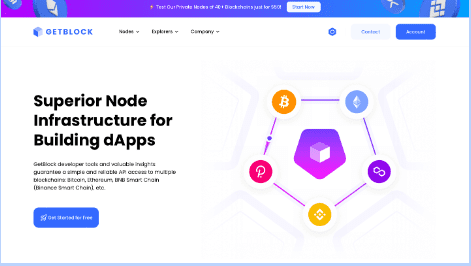Decentralized applications, or dApps, are experiencing more widespread adoption in 2023. These smart contract-based programs store and exchange data using blockchain technology. DApps are becoming more and more popular as businesses look for methods to improve productivity and cut expenses. With peer-to-peer nodes and smart contracts, blockchain networks provide dApps with a limitless number of options.
Using dApps, one can protect privacy or preserve the flexibility of dApp development while reducing censorship from centralized entities. Moreover, dApps are essential for increasing Web3 integration.
To create an efficient decentralized application, one needs blockchain nodes — the backbone of the distributed ledger system. What are they? Let’s dive right in!
Overview of blockchain nodes: what are they?
Nodes comprise every blockchain. These are typically computer systems that hold a copy of the core protocol and the complete transaction history of a blockchain. Any person can operate a node anywhere in the world thanks to decentralization as long as they are linked to the decentralized blockchain network and have the necessary resources.
Blockchain nodes guarantee that networks are open-source and permissionless. Information and data continue to be democratized because users make sure to manage nodes at random. Therefore, no big business can ever take over a blockchain and/or its properties.
As a result, the cryptocurrency industry is now entirely autonomous and continues to adhere to Satoshi Nakamoto’s underlying philosophical principles, when creating Bitcoin.
Each blockchain node has a specific purpose, but they all help to provide smooth maintenance of every transaction on the blockchain. As a result, there are various node types designed to handle particular use cases and niche tasks.
For example, a Bitcoin full node carries the main responsibility of verifying the status of the Bitcoin network. It does so by gathering each block and transaction and comparing them to the consensus guidelines of Bitcoin. A Bitcoin full node will immediately reject a transaction or block that disobeys one of Bitcoin’s consensus guidelines.
How do you run a blockchain node?
There are a number of ways to deploy a blockchain node: by yourself or via an RPC node provider. Be aware that running a self-hosted blockchain node requires a sizable amount of storage, memory, and computing power. High internet rates and the most recent operating system version are also necessary.
You should also make sure your system can function uninterruptedly for a minimum of six hours each day. What’s more, you should have the necessary software to run your node. Maintaining a node can take up quite a lot of your time. Most likely you will have to deploy your own professional team to maintain the node infrastructure. This may lead to huge costs, electricity bills, and more.
Alternatively, you can always deploy blockchain nodes, like a Bitcoin full node, with the help of a BaaS provider. For instance, we recommend you check out GetBlock — a team of professional developers that will help you save your time and money by granting immediate access to 40+ leading networks. So what does GetBlock do, exactly?
Run blockchain nodes with GetBlock
Meet GetBlock — your one-stop support system in the world of Web3 development. Operating since 2019, GetBlock has helped to supercharge numerous decentralized applications with the help of its innovative infrastructure and reliable services.
Are you looking for ways to deploy blockchain nodes? Do you want to build your own product by using a Bitcoin full node? No problem! With GetBlock, select between shared and dedicated node options. Experiment with your dApps before going on-chain or set your own rules for the node infrastructure you need. The choice is yours.
What’s more, you can try out GetBlock’s daily free plan of 100,000 requests if you are not ready to commit yet.
Closing thoughts
Are you a professional Web3 developer or a newbie in the crypto world? Blockchain nodes — a critical component of a blockchain — can help all crypto enthusiasts skyrocket their projects to success. If you want to get instant access to blockchain nodes, try out GetBlock and see the immediate results yourself.




































